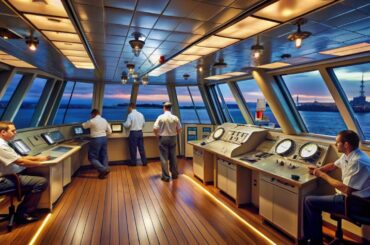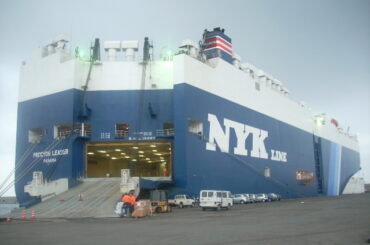To become a cruise ship captain, you’ll start with an accredited maritime education, enrolling in programs that focus on maritime studies or nautical science. You’ll gain essential knowledge in navigation, ship handling, and sea conditions. Next, you’ll accumulate hands-on experience through positions like deck cadet or third mate, building expertise in vessel and crew management. Certifications are crucial too; ensure you acquire a Certificate of Competency (CoC) and STCW certification for safety, along with training in crowd management. Climbing the ranks involves mastering navigational skills, managing crew dynamics, and developing strong leadership abilities. Each step brings you closer to the command center of a cruise ship, revealing more ways to bolster your journey forward.
Understanding the Role
In the pursuit of becoming a cruise ship captain, it’s essential to first grasp the full scope of the role. You’ll be at the helm, not just steering the ship, but also overseeing all onboard operations. This position demands a deep understanding of ship responsibilities and robust leadership skills.
As captain, you’re the ultimate authority on board. Your primary duty is to ensure the safety of the vessel and everyone on it. This means you’re responsible for navigating through various weather conditions and maritime traffic, making decisions that can affect hundreds, if not thousands, of lives.
You’ll also manage the ship’s crew, which requires you to be adept in human resource management, conflict resolution, and team leadership. Leadership skills are paramount. You must inspire and direct a large team, ensuring that all members are motivated, well-trained, and aligned with the cruise line’s standards and safety protocols.
Effective communication is critical. You’ll need to be clear and decisive in giving orders, but also approachable and understanding to both crew and passengers.
Understanding and mastering these aspects are crucial steps on your journey to becoming a cruise ship captain. Embrace the challenge, and you’ll steer your career towards remarkable success.
Required Educational Path
To embark on a career as a cruise ship captain, you’ll need to start with a solid educational foundation. Your journey begins at accredited maritime schools that specialize in maritime education and training. These institutions offer specialized programs that focus on the core skills required for maritime leadership, including navigation courses, ship handling, and maritime law.
You’ll need to enroll in a program that leads to a degree in maritime studies or nautical science. These courses are intensive and cover a wide range of topics crucial for your future role. You’ll delve deep into navigation techniques, learning how to safely guide a massive vessel through various waterways using the latest technology and traditional methods.
Additionally, you’ll study meteorology, oceanography, and environmental science, which are essential for understanding the conditions at sea. It’s not just about managing the ship, but also understanding the legal and regulatory aspects of maritime operations.
Courses in maritime law and international regulations will prepare you to comply with global maritime standards and ensure the safety of your vessel and passengers. By completing this rigorous educational path, you’ll be well-equipped to take on the challenges of a cruise ship captain.
Gaining Relevant Experience
Once you’ve earned your degree in maritime studies or nautical science, the next step is to accumulate hands-on experience at sea. This stage is critical in shaping you into a competent candidate for a cruise ship captain.
Here’s how you can gain the necessary experience:
- Start with Entry-Level Positions: Jump aboard as a deck cadet or a third mate. These roles provide you with the foundational practical training needed for ship operations. You’ll learn navigation, safety procedures, and cargo handling directly on the job.
- Participate in Professional Training Programs: Many shipping companies and maritime academies offer structured training programs that enhance specific skills. These programs often include simulations and real-world problem-solving scenarios, which are invaluable for your growth.
- Leverage Networking Opportunities: Engage with industry professionals at seminars, workshops, and conferences. Networking isn’t just about finding job opportunities; it’s also about learning from experienced captains and crew, gaining insights into the industry, and understanding diverse operational cultures.
Each step you take should build your expertise and confidence in managing a large vessel and its crew.
Obtaining Necessary Certifications
After gaining essential experience at sea, you’ll need to obtain several key certifications to advance toward becoming a cruise ship captain. These certifications ensure you’re equipped with the necessary safety, navigation, and operational knowledge crucial for the role.
Here’s what you need to focus on:
First, prioritize the Standards of Training, Certification, and Watchkeeping (STCW) certification. This international standard is mandatory and covers basic safety, firefighting, and survival skills.
You’ll also need a specialized training program in crowd management—a crucial skill for handling large numbers of passengers.
Next, look into obtaining a Certificate of Competency (CoC), which verifies your ability to operate a vessel safely. This requires passing rigorous exams that test your understanding of maritime law, meteorology, ship stability, and emergency procedures.
Additionally, consider advanced certification types such as the Dynamic Positioning (DP) certification if you aim to work on ships equipped with this technology.
Also, leadership and management training programs will be invaluable as they prepare you to handle the responsibilities of a captain.
Climbing the Maritime Ranks
Climbing the maritime ranks requires a structured approach, beginning with entry-level positions such as a deck cadet or third mate. As you ascend the hierarchy, each role demands more from you in terms of navigational skills, leadership qualities, and crisis management.
Your journey will involve mastering several key aspects:
- Navigational Skills: You’ll need to demonstrate precision in plotting courses, understanding maritime charts, and handling sophisticated navigation equipment. These are foundational skills that ensure the safety and efficiency of the vessel’s journey.
- Leadership and Teamwork Dynamics: Leadership isn’t just about giving orders; it’s about fostering teamwork, managing crew dynamics, and ensuring everyone is aligned with the ship’s protocols. Strong communication techniques are essential, allowing you to clearly convey instructions and ensure that they’re executed properly.
- Crisis Management and Maritime Safety: Knowing how to react in emergencies, coordinate evacuations, and handle unexpected incidents at sea is crucial. You’ll need to be well-versed in maritime safety regulations and proficient in applying them under pressure.
As you grow in these areas, your ability to lead a cruise ship effectively will enhance, setting you up for the ultimate role of captain.
Continuing Professional Development
Continuing your professional development is essential as you progress toward becoming a cruise ship captain. This journey isn’t just about accumulating hours at the helm; it’s about evolving in your role through strategic learning and connecting with others in the industry.
The leadership skills you develop will directly impact your efficacy in commanding a vessel and managing its crew. They serve not only as technical proficiencies but as essential tools in navigating complex human dynamics and crisis situations.
Engaging in regular training sessions, whether they’re formal educational courses or on-the-job experiences, helps keep your knowledge base not only current but also expanding.
Additionally, don’t overlook the power of networking opportunities. Attend maritime conferences, join professional forums, and connect with experienced captains. These interactions can provide invaluable insights and open doors to advancements that aren’t accessible through traditional pathways.







